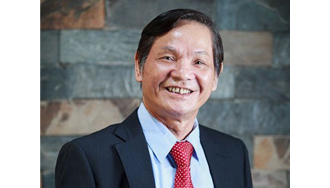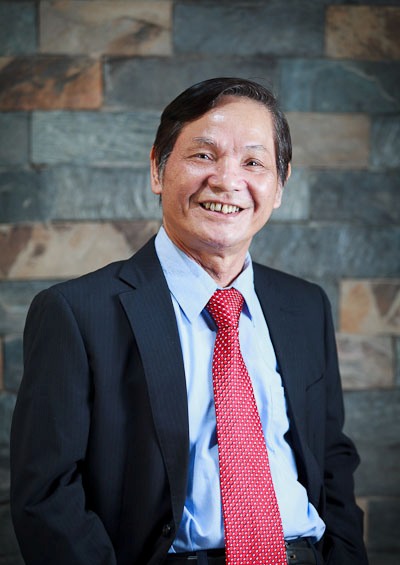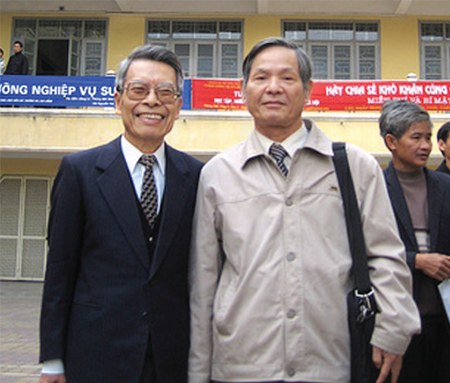
In 1978, I had just stayed at the school for a year when I was sent with Professor Nguyen Ham Duong to take students to do research on language education (Kinh language) in the ethnic minority areas of Cao Bang. At that time, traveling by train was very difficult. When arriving at the place, when returning to the villages, we mainly walked. Professor Nguyen Ham Duong was tall, dignified, and very elegant, looking like a Westerner. Some Tay and Nung men and women mistook me and asked me in a low voice, "Are you from the Soviet Union?". As for me, I was literally a page boy, small and skinny. Wading through streams, over hills, across villages, the oral history "Evacuation and Interpretation" from Dai Tu, Thai Nguyen, Professor Ham Duong told me as he remembered, which helped me to relieve my fatigue. Among them were stories about the teachers of the Department of Languages, now the Faculty of Linguistics. The story went like this. Mr. Ham Duong said: “Giap (Professor Nguyen Thien Giap) was very good. When I was in Dai Tu, my group (Language Department - VDN) sent someone to give a lecture to a department of the school (…). The brothers there valued it very much, and they were also very productive, raising goats, so they gave one to organize a festival to improve (at that time, there was no remuneration, payment like later - VDN). No one knew how to butcher, except me (Mr. Ham Duong often referred to himself intimately to his brothers and students like that). I said: Let me butcher it, but someone must help. Giap was assigned. A young cadre, a young man. I told Giap to take the goat out to the grass, tie it up, then take a whip and whip it, chase it around, let it sweat all out, then butcher it to eat to feel better. So Giap had to do it right away. After a while, before I could see the goat sweat, Giap was already sweating all over. I was so amused, I said: Okay, Giap, go out.” After sweating, we killed Giap first, then the goat. The whole department almost died of laughter. The teacher laughed and said to me: "Do you think our group is happy?" Then I kept remembering that funny story...

Prof. Dr. People's Teacher Nguyen Thien Giap
He was awarded the State Prize for Science and Technology in 2010 for the following works:Vocabularyg learn Vietnamese, Vietnamese words and word recognition.
Nearly twenty years later, heteaching staffyoung (not called that back then)lectureras now, but called like that) Nguyen Thien Giap (compared to Professor Nguyen Ham Duong when in Dai Tu) appeared in the list of Doctors, Professors, People's Teachers of the University of Social Sciences and Humanities, Vietnam National University, Hanoi; in 2010, he was recognized by the State Award Council, to step up to the honorary position of receivingState Awardabout science and technology
Professor Nguyen Thien Giap's training process was "made in Hanoi University" 100%; and his high school education was in the countryside of Dan Phuong, Ha Tay (now part of Hanoi). In the young days of the Professor and of us, his students at that time, those who were sent to study abroad were very lucky. It was very difficult, because they had to meet many conditions. He took the entrance exam for postgraduate students to be sent to study abroad. He scored very high, but... he couldn't go. So... that's it. Then he still sat at the table in the communal thatched house, with earthen walls, rickety in the corner of the Me Tri dormitory in the past; and since it was a career, he had to wear out his eyes reading books and studying books. There was such a strange time.
I don't remember exactly which year, but it was definitely the last time Professor Nguyen Tai Can returned to Vietnam and then went to Moscow and passed away in 2011. One day, the Professor called me over, gave me some documents, and then he said: "This set is Giap's documents. It's been a long time. Give it back to Giap." It was a set of about a dozen old checkered student notebooks, small letters, blue ink, filled with vocabulary materials in the book.Dai Nam National Phonetic Dictionary(1895-1896) by Huynh Tinh Paulus Cua. Professor Giap hand-copied that document when he had just graduated. At that time, seeing the bookDai Nam National Phonetic Dictionaryare also rare opportunities.
Then he successfully defended his doctoral thesis (formerly called associate doctoral thesis) in 1983, was recognized and appointed to the title of Professor in 1996. Before the lamp, more than a dozen books written individually and jointly, along with about dozens of research articles by the Professor were successively published, in which,Group of works on Vietnamese words and vocabularywon the State Prize in 2010. As a student of the Professor, in the same department, working with him a lot, familiar and close, on occasions when I congratulated him, I often said something a bit silly "Teacher, you have done so many things", then he said, roughly: "I am like you (he often called me that), both were farmers, if I don't try hard, be diligent and serious in my work, then what can I achieve?" I understood, that was also the advice he gave me.

Prof. Dr. People's Teacher Doan Thien Thuat and Prof. Dr. People's Teacher Nguyen Thien Giap
Two works awarded the State Prize by Professor Nguyen Thien Giap:Vietnamese Vocabulary, Vietnamese Words and Word Recognitionis a group of works that examines in-depth theoretical issues aboutfromandfrom VietnamesewithVietnamese vocabulary. With these two works, for the first time, a theoretical framework for the definition and identification offromas well as a theoretical framework for definition, identificationVietnamese wordssummarized quite fully, at the same time, the author's problem-solving ideas have been applied closely, thoroughly, consistently, and with high objectivity. The theoretical issues proposed by these two works have brought to Vietnamese linguistics a new way of looking at and explaining relevant issues that need to be solved, thanks to starting from the practice of Vietnamese itself, coordinating well with reasonable scientific viewpoints in linguistic theory, and at the same time, solving problems on mutually supportive observational dimensions in a dialectical way: synchronicity and diachrony, system and function, activity, center and boundary... Therefore, solving theoretical problems about Vietnamese words and word recognition avoids "over-the-top" solutions that always have to justify the consequences caused by applying a theoretical framework that is not systematic, logical, or thorough.
Tuy không thể nói là hoàn hảo, nhưng hai công trình này thực sự là một bước tiến đáng kể trong lĩnh vực nghiên cứu lý luận về from tiếng Việt và những vấn đề về từ vựng có liên quan, nếu xét cả về tính chất mới mẻ lẫn tính chất hệ thống, triệt để và phù hợp thực tiễn Việt ngữ. Vì thế, có thể nói, hai công trình nói trên có đóng góp cho lý luận về từ nói chung và lý luận về từ tiếng Việt nói riêng. Đối với các nghiên cứu hữu quan về Việt ngữ, hầu như không có nghiên cứu nào về từ lại không nhắc đến hai công trình nói trên, để hoặc là tán thành, hoặc là phải phản bác lại để rẽ theo lối đi không triệt để như vậy.
Hồn hậu vượt khó, là điều dễ nhận thấy ở Giáo sư Nguyễn Thiện Giáp. Vào những năm khó khăn, cực khổ của đất nước, ông cũng như bao người khác vừa thâu đêm qua những trang sách, vừa bạc mặt lo chuyện áo cơm. Cũng phải cùng cả nhà nuôi thêm con lợn con gà để cải thiện, bổ trợ cho đời sống hàng ngày. Mà chả thấy ông kêu ca khó nhọc gì. Tính vốn lành, ông thường vui vẻ nói với tôi: “Tôi được nhờ vợ tất chú ạ”. Năm 1978, Giáo sư cùng với tôi vào Đà Nẵng chuẩn bị tiền trạm để đưa sinh viên vào thực tập. Đất nước đang lúc quá khó khăn. Tiền Bắc, tiền Nam chưa thống nhất, mỗi người đi công tác chỉ được đổi rất ít, không còn nhớ được chính xác là bao nhiêu, chỉ nhớ là rất ngặt, khoảng năm đồng. Tàu Thống nhất ành ạch chạy vài ngày đêm mới vào đến Đà Nẵng. Ngồi suốt trên ghế gỗ, cứng người ra. Rệp cắn sưng mông. Đêm đầu tiên trên tàu, tôi đang nghĩ chưa biết tính nước ngủ thế nào thì thấy Giáo sư tỏ ra là nhiều kinh nghiệm, lấy một tấm áo mưa mang sẵn, chui xuống gầm ghế trải ra, rồi bảo: “chui xuống đây nằm ngủ đi”. Tôi chui xuống, làm theo. Cái túi lép kẹp với hai bộ quần áo làm gối. Tàu lắc. Tiếng rít của bánh sắt trên đường ray như còn hằn vào tai đến tận bây giờ. Vậy mà chỉ một lúc, người đã vào giấc hết sức ngon lành. Chuyến ấy đi tiền trạm ấy không thành, không đưa sinh viên vào miền Tây Quảng Nam Đà nẵng được, vì còn Fulro quấy nhiễu. Chúng tôi quay ra, chuyển hướng đi Cao Bằng; và tôi lại tháp tùng thầy Hàm Dương lên trên ấy. Năm sau, 1979, quân Tàu đánh ta trên toàn bộ biên giới Việt Trung. Đất nước lại một phen tao loạn.
Giáo sư Giáp là một trong những người góp phần làm nên sức mạnh của bộ môn, rồi Khoa Ngôn ngữ học. Lý luận ngôn ngữ, từ vựng và ngữ nghĩa tiếng Việt, dụng học Việt ngữ là những lĩnh vực ông quan tâm nhất và ra sức truyền đạt cho học trò. Hàng chục nghiên cứu sinh đã được Giáo sư hướng dẫn nghiên cứu và bảo vệ luận án thành công. Ngoài giảng dạy ở trường nhà (Đại học Tổng hợp, Đại học Khoa học xã hội và Nhân văn), ông còn tham gia giảng dạy ở Trường Đại học Khoa học Xã hội và Nhân văn Thành phố Hồ Chí Minh cùng nhiều trường đại học và viện nghiên cứu khác. Năm 1986 - 1988, ông là giáo sư thỉnh giảng tại Đại học Paris VII (Cộng hòa Pháp) và năm 1997 là giáo sư thỉnh giảng tại Đại học Phương Đông, Napoli, Italia. Khi được mời, được bầu làm Trưởng phòng Tổ chức Trường Đại học Tổng hợp, Tổng Biên tập, Phó Giám đốc Nhà xuất bản Đại học Quốc gia Hà Nội, Chủ nhiệm bộ môn Biên tập và Xuất bản, khoa Báo chí, trường Đại học Khoa học Xã hội và Nhân văn của Đại học Quốc gia Hà Nội, Chủ nhiệm bộ môn Việt ngữ học của Khoa Ngôn ngữ học, Uỷ viên Hội đồng chức danh giáo sư ngành Ngôn ngữ học, Giáo sư cũng sẵn sàng đảm nhận như một công việc, một trách nhiệm với Nhà trường, với cộng đồng; rồi xong việc thì thôi, lại nhanh chóng quay về với nghiệp chính: nghiên cứu, giảng dạy và đào tạo. Tôi biết, Ông luôn cố gắng, mà cố gắng một cách hồn nhiên, để làm việc, để cày xới chữ nghĩa. Điều làm tôi thêm trọng ông là ông rất trọng lao động và thành quả lao động của người khác. Nghe anh em đồng nghiệp xa gần làm được gì, công bố được gì, Giáo sư thường hỏi tôi đã biết chưa, nếu chưa, thì ông thông báo. Và vẻ vui mừng ánh trên gương mặt. Với học trò mới lập nghiệp, ông thường thân tình hỏi thăm đứa này đứa kia đã làm được những gì.
Ham làm việc và yêu thích công việc của mình, vậy mà sau những bàn thảo thảo, chuyện vãn “liên chi hồ điệp” về việc này việc nọ trong nghiên cứu, trong giảng dạy, trong đào tạo học trò, Giáo sư lại hay nhớ quê, hay say sưa kể cho tôi nghe món nõn khoai môn kho dừ với cá của con nhà nghèo mà ông ưa thích, kể về những xưa ngày thơ bé đi hái măng tre hoặc nhặt quả xoan khô về đốt lấy tro ngâm nước làm bánh tro để có màu xanh như ngọc lục hay màu vàng nâu hổ phách của bánh tro quê ông. Sống đơn giản, nên đôi khi Giáo sư có những niềm tin thật “ngộ”. Hồi Cô Hường, phu nhân của ông, đi công tác ở Campuchea, có một hôm, tôi ghé qua nhà ông vào một buổi chiều hè oi ả. Khẽ gõ cửa, chẳng thấy ai trả lời, tôi quanh ra chỗ cửa sổ mở, nhìn vào, thấy một cảnh như Liêu trai. Giáo sư mặc quần đùi, cởi trần ngồi im đọc sách, trên người dán dăm bảy miếng gì đó xanh xanh như lá cây. Tôi gọi. Ông ra mở cửa. Tôi nhận ra những lá cây gì đó được vò nát và dán trên người ông. Cháu Khoa, con trai ông (kiến trúc sư Nguyễn Thiện Khoa bây giờ), hồi ấy còn rất bé, đang ngủ giữa sàn nhà, trên người cũng dán vài ba miếng. Tôi chỉ tay vào ông, hỏi: “Thầy làm gì thế này?”. Ông cười rất tươi, hồn nhiên bảo: “Trời nóng quá. Mọc mấy cái nhọt. Cái này bí truyền, tôi được một người mách cho đấy. Lá táo vò khéo cho mịn rồi dán vào. Tiêu độc. Mát lắm”. Tôi cười mà nụ cười chắc méo, dù không tự nhìn thấy được. Nhưng cũng lây cái vui, cái hồn nhiên hiếm có ấy của ông.
Bây giờ, có lúc ngồi nhớ lại những câu chuyên cũ, tôi cứ nghĩ, phải chăng niềm vui công việc đã cuốn hút Giáo sư Giáp vào cái nghiệp của Ông và đem đến cho ông những chùm quả ngọt: gia đình hạnh phúc, đóng góp nhiều công sức cho Khoa cho Trường, thành tựu khoa học đáng nể, anh em đồng nghiệp, học trò tin yêu, quí trọng. Tôi chúc mừng Thầy Giáp của chúng tôi; và chợt ngoảnh lại: trước khi được hái quả, biết bao nhiêu công sức Thầy đã đổ ra ... Mà lạ, hình như cứ thấy thấp thoáng câu chuyện đầm đìa mồ hôi vui vẻ hôm làm thịt dê từ những năm nảo năm nào…
|
PROFESSOR, DOCTOR, PEOPLE'S TEACHER NGUYEN THIEN GIAP
+ Work unit: Faculty of Literature (Hanoi University of Science). Faculty of Linguistics (University of Social Sciences and Humanities). + Management position: Deputy Head, Party Secretary of the Faculty of Philology (Hanoi University of Science) (1989-1992). Head of Personnel Organization Department, Deputy Secretary of Party Committee of Hanoi University of Science (1992-1996). Head of Department of Social Sciences and Humanities (Faculty of Journalism), Head of Department of Editing and Publishing (Faculty of Journalism) (1991-1996). Standing member of the Party Committee of Hanoi National University, Deputy Secretary of the Party Committee of the University of Social Sciences and Humanities (1996-2000). Deputy Director, Editor-in-Chief of Hanoi National University Publishing House (2000-2003). Head of Vietnamese Linguistics Department (Faculty of Linguistics) (1996-2014).
Visiting Professor, University of the Orient, NAPOLY, Italy (1997).
Vietnamese words and vocabulary, Hanoi National University Publishing House, 2015. Linguistics Textbook, Hanoi National University Publishing House, 2008. History of Vietnamese Linguistics, volume 1, 2004; volume 2, 2006 (Good books celebrating the 50th anniversary of the founding of Hanoi Education Publishing House). 4.777 linguistic concepts, Hanoi National University Publishing House, 2010 (Hanoi National University Science and Technology Award, 2010) Methodology and methods of language research, Vietnam Education Publishing House, 2012 (Bronze Prize for Best Book 2013).
+ State Prize for Science and Technology in 2010 for a cluster of works on Vietnamese vocabulary and lexicology, includingVietnamese vocabulary, Vietnamese words and word recognition. + Hanoi National University Science and Technology Award 2010 for the project4. 777 linguistic concepts. + Bronze Prize for Good Book 2013 for the projectMethodology and methods of language research. |
Author:Prof. Dr. Vu Duc Nghieu